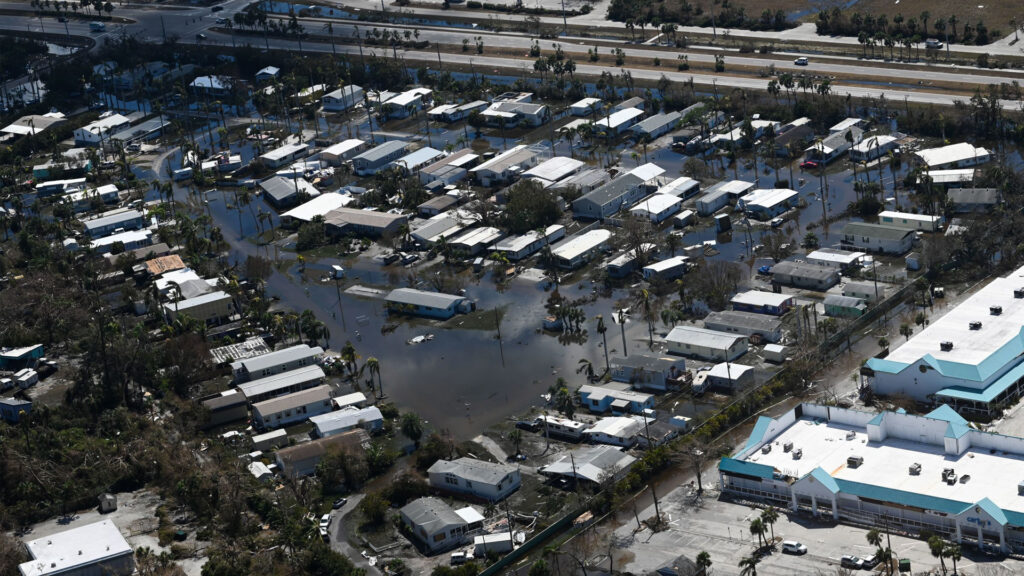By Jessica Garcia, OtherWords.org
In an era of climate disasters, Americans in vulnerable regions will need to rely more than ever on their home insurance. But as floods, wildfires and severe storms become more common, a troubling practice known as “bluelining” threatens to leave many communities unable to afford insurance — or obtain it at any price.
Bluelining is an insidious practice with similarities to redlining — the notorious government-sanctioned practice of financial institutions denying mortgages and credit to Black and brown communities, which were often marked by red lines on map.
These days, financial institutions are now drawing “blue lines” around many of these same communities, restricting services like insurance based on environmental risks. Even worse, many of those same institutions are bankrolling those risks by funding and insuring the fossil fuel industry.

Originally, bluelining referred to blue-water flood risks, but it now includes other climate-related disasters like wildfires, hurricanes and severe thunderstorms, all of which are driving private-sector decisions. (Severe thunderstorms, in fact, were responsible for about 61% of insured natural catastrophe losses in 2023.)
In the case of property insurance, we’re already seeing insurers pull out of entire states like California and Florida. The financial impacts of these decisions are considerable for everyone they affect — and often fall hardest on those in low-income and historically disadvantaged communities.
A Redfin study from 2021 illustrated that areas previously affected by redlining are now also those prone to flooding and higher temperatures, a problem compounded by poor infrastructure that fails to mitigate these risks. This overlap is not a coincidence but a further consequence of systemic discrimination and disinvestment.
This financial problem exists no matter where you live. In 2024, the national average home insurance cost rose about 23% above the cost of similar coverage last year. Homeowners across more and more states are left grappling with soaring premiums or no insurance options at all. And the lack of federal oversight means there is little uniformity or coordination in addressing these retreats.
This situation will demand a radical rethink of how we approach investing in our communities based on climate risks. For one thing, financial institutions must pivot from funding fossil fuel expansion to investing in renewable energy, natural climate solutions and climate resilience, including infrastructure upgrades.
What about communities in especially vulnerable areas?
One strategy is community-driven relocation and managed retreat. By relocating communities to low-risk areas, we not only safeguard them against immediate physical dangers but also against ensuing financial hardships. Additionally, preventing development in known high-risk areas can significantly decrease financial instability and economic losses from future disasters.

As part of this strategic shift, financial policies must be realigned. We need regulations that compel financial institutions to manage and mitigate financial risk to the system and to consumers. We also need them to invest in affordable housing development that is energy-efficient, climate-resilient, and located in areas less susceptible to climate change in the mid- to long-term.
Meanwhile, green infrastructure and stricter energy efficiency and other resilience-related building codes can serve as bulwarks against extreme temperatures and weather events.
The challenge of bluelining offers us an opportunity to forge a path towards a more resilient and equitable society. We owe it to the future generations to do more than just adapt to climate change. We also need to confront and overhaul the systems that harm our climate. The communities most exposed to climate change deserve no less.
Jessica Garcia is a senior policy analyst for climate finance at Americans for Financial Reform Education Fund. For more on bluelining, see Jessica’s two-part blog series at OurFinancialSecurity.org. This op-ed was distributed by OtherWords.org.
If you are interested in submitting an opinion piece to The Invading Sea, email Editor Nathan Crabbe at ncrabbe@fau.edu. Sign up for The Invading Sea newsletter by visiting here.



